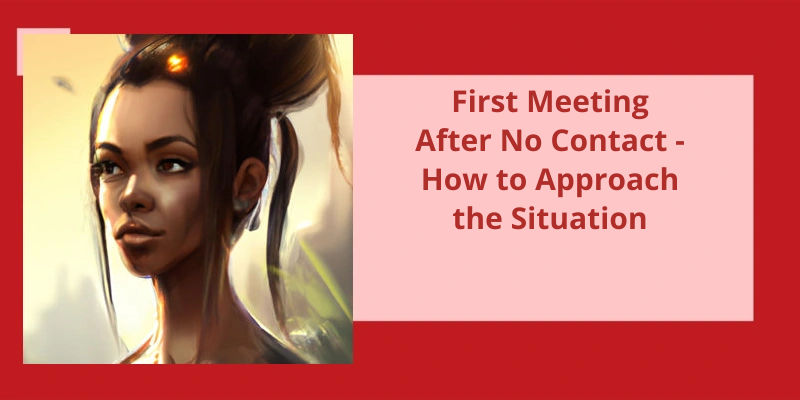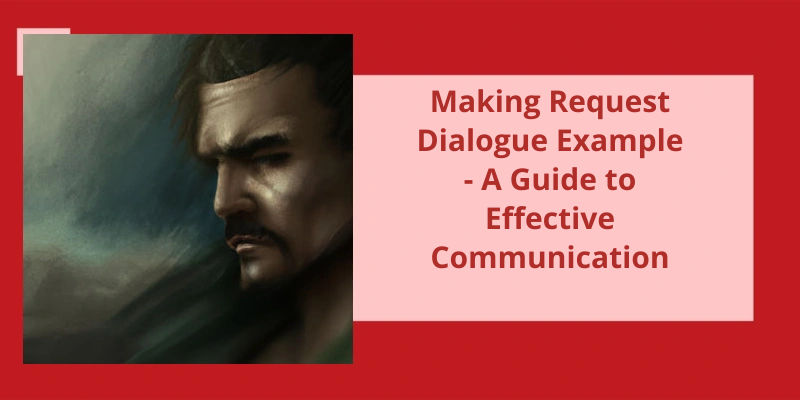There are few things more anxiety-inducing than a first meeting following a period of no contact. Whether it's an old friend, a former flame, or a family member, the thought of reconnecting after time apart can leave us feeling vulnerable and unsure. But while it's natural to feel nervous or apprehensive about the prospect of a reunion, it's important to remember that a little distance can be a good thing. It can give you time to reflect on what you want from the relationship and give the other person space to do the same. However, it's important to establish some ground rules for re-establishing a connection, particularly when it comes to initiating contact. Ideally, you’d wait for the other person to reach out to you, but if there were plans to meet again, it can be unclear who should take the first step. So give them a few days to get in touch, and if you don't hear from them, take the initiative and reach out yourself. It may feel awkward at first, but remember that a little effort can go a long way in rekindling a dormant relationship.
Should I Text Him First After No Contact?
It’s understandable to feel hesitant about reaching out first after a period of no contact. You may worry about seeming too eager or desperate, or fear that the other person has moved on. However, taking the initiative to text them can actually be a positive thing. It shows that you’re willing to put yourself out there and take a risk for the sake of your relationship.
Of course, there are some circumstances in which reaching out first may not be appropriate. If the other person has made it clear that they don’t want to communicate with you, it’s important to respect their wishes and give them space. Additionally, if you feel that reaching out would put you in a vulnerable or unsafe position, it’s best to err on the side of caution.
How to Maintain Boundaries and Protect Yourself Emotionally During the Process of Reaching Out After No Contact
Maintaining boundaries and protecting oneself emotionally during the process of reaching out after a period of no contact involves actively identifying and setting specific limits in communication and interactions with the other party. It also involves being aware of one’s own emotional needs and limits, and taking steps to meet them while avoiding unhealthy behaviors or destructive patterns. Strategies may include clear communication, seeking support from a trusted source, and being prepared to take a step back or end contact if necessary.
Now that we’ve talked about the idea of breaking the no contact rule, let’s dive deeper into the different scenarios and factors to consider before making any decision. It’s important to approach the situation with a clear mind and set realistic expectations. So, who should make the first move after no contact? Let’s explore.
Who Should Make the First Move After No Contact?
However, it’s important to consider why you and your ex went no contact in the first place. If it was due to toxic behavior or abusive tendencies, it may not be healthy for either of you to break the no contact rule. In those instances, it may be best to continue staying separated and focusing on healing and self-improvement.
On the other hand, if the reason for no contact was simply due to a breakup or a disagreement, and you both have had time to reflect and work on yourselves, then breaking the silence might actually be a positive step forward. It shows that you’re mature enough to set aside any hurt feelings or pride, and are open to communication and possibly reconciliation.
It’s important to approach the situation with honesty and vulnerability. Be clear about your intentions and what you hope to gain from reaching out. Dont play games or use manipulation tactics to try and get them to respond. Your ex will likely be able to pick up on any insincerity or ulterior motives, and it will only push them further away.
At the same time, it’s also important to be prepared for any outcome. Your ex may not be ready or willing to communicate, and it’s important to respect their boundaries and give them the space they need. Alternatively, they may respond positively and be open to rekindling a relationship. In either scenario, make sure to continue prioritizing your own emotional well-being and growth.
In summary, there’s no one right or wrong answer for who should make the first move after no contact. It ultimately depends on your unique situation and the reasons for the break in communication. If you do decide to break the silence, approach the situation with honesty, vulnerability, and respect for your exs boundaries. And above all, prioritize your own emotional health and growth.
When it comes to relationships, the no contact rule can be a useful tool in healing and moving on. But how long should you wait before reaching out to your ex? The length of the relationship can play a part in determining the appropriate amount of time to wait. If you were together for at least 6 months, it’s recommended to take a 2-month break before considering reaching out.
How Long Should You Wait to Reach Out After No Contact?
It’s important to remember that no contact isn’t about playing games or trying to manipulate the other person. It’s about giving yourself the time and space to heal and move on from the relationship. It’s also important to make sure that youre not using no contact as a way to avoid dealing with your emotions. If you find yourself constantly thinking about the other person or feeling overwhelmed by your emotions, it may be a sign that you need to seek support from a therapist or trusted friend.
During the no contact period, it’s important to focus on your own personal growth and self-care. This may involve taking up a new hobby, spending time with friends and family, or working on personal goals. It’s also important to reflect on the relationship and what you learned from it. This can help you gain clarity on what you want and need in a future relationship.
After the no contact period is over, it’s important to approach the other person with an open mind and without expectations. It’s possible that the other person has moved on or isn’t interested in reconnecting. If this is the case, it’s important to accept their decision and continue to focus on your own personal growth.
If the other person is open to reconnecting, it’s important to approach the situation with honesty and vulnerability. This may involve being upfront about your feelings, expressing remorse for past mistakes, and asking for forgiveness. It’s also important to listen to the other persons perspective and be willing to make compromises and work towards a mutually beneficial outcome.
Overall, the length of the no contact period will depend on a variety of factors, including the length and nature of the relationship, the reason for the breakup, and individual circumstances. It’s important to approach the situation with empathy and emotional intelligence, and to prioritize your own personal growth and well-being.
After going through a period of no contact with an ex, it can be daunting to muster up the courage to start a conversation again. However, if you’re ready to reach out, there are a few ways you can ease into it. Instead of jumping into a weighty topic right away, consider starting with something light and low-pressure, like a question or a simple request. Keep reading for some tips on how to text your ex after no contact.
How Do You Start a Conversation After No Contact?
Starting a conversation after a period of no contact can be a daunting task, particularly when it comes to reaching out to an ex. However, with a little tact and delicacy, it’s possible to get the conversation started in a positive manner. One of the most effective ways to initiate a dialogue is to ask for help remembering something from your past relationship. This type of approach works particularly well if youre looking to spark a conversation for the first time in a while. It can be something simple, like remembering the name of a favorite restaurant, or something more complex like an anniversary.
Another option is to seek practical help with a specific problem youre facing. This is particularly useful if your ex is the kind of person who enjoys helping others. For instance, if you need advice on a new job or relationship, you could reach out to your ex for some guidance. This kind of approach isn’t only non-threatening, but it also allows you to reconnect in a way that’s helpful and productive.
If you want to get an update on what’s been happening in your exs life, you can always touch base with them and ask them how they’ve been doing during the “no contact” period. This can be done casually, but it’s important to remember to respect your exs privacy and only ask questions that are appropriate. A simple “Hey, it’s been a while. I was just wondering how you’ve been doing?” can be enough to get the ball rolling.
Sometimes, dropping a hint that you still remember your exs likes or dislikes can be an effective way to spark their interest. This could be anything from a mention of their favorite movie to a shared memory or inside joke. The key to success here, however, is to avoid being too overt or aggressive. The last thing you want to do is come across as manipulative or insincere.
When seeking to re-establish contact with an ex, it’s important to be mindful of their feelings and emotions. Remember that it can be challenging for them to open up old wounds, so be prepared to take things slow and be sensitive to their needs. Engage in small talk, be honest and open about your intentions, and try to keep the conversation positive and upbeat. With a little patience and persistence, it’s possible to reconnect with an ex and rebuild a relationship that’s meaningful and rewarding for both parties involved.
Tips for Maintaining Boundaries During Reconnection With an Ex
- Set clear boundaries with your ex from the beginning of the reconnection process.
- Communicate your expectations and needs clearly and firmly.
- Avoid falling into old patterns and behaviors that led to the break up.
- Be mindful of your feelings and prioritize your emotional well-being.
- Avoid getting too emotionally invested too quickly.
- Don’t isolate yourself from friends and family because of your reconnection with your ex.
- Take things slow and don’t rush into anything.
- Don’t ignore any red flags or warning signs that may arise.
- Consider seeking support from a therapist or counselor during the process.
Source: 13 Simple Ways to Text Your Ex After No Contact – wikiHow
Conclusion
In conclusion, the first meeting after a period of no contact can be a delicate situation. It's important to give the other person time to process and reflect on the meeting before reaching out again. Three days is a good rule of thumb to allow for some space, but ultimately, communication between both parties is key. If there was talk of meeting again soon, it may be ambiguous as to who should initiate the next contact, but remember that there’s no harm in taking the lead and reaching out first. Above all, trust your instincts and be genuine in your intentions. Making a connection after a hiatus can be nerve-wracking, but with patience and understanding, it can also be an exciting opportunity for growth and collaboration.






